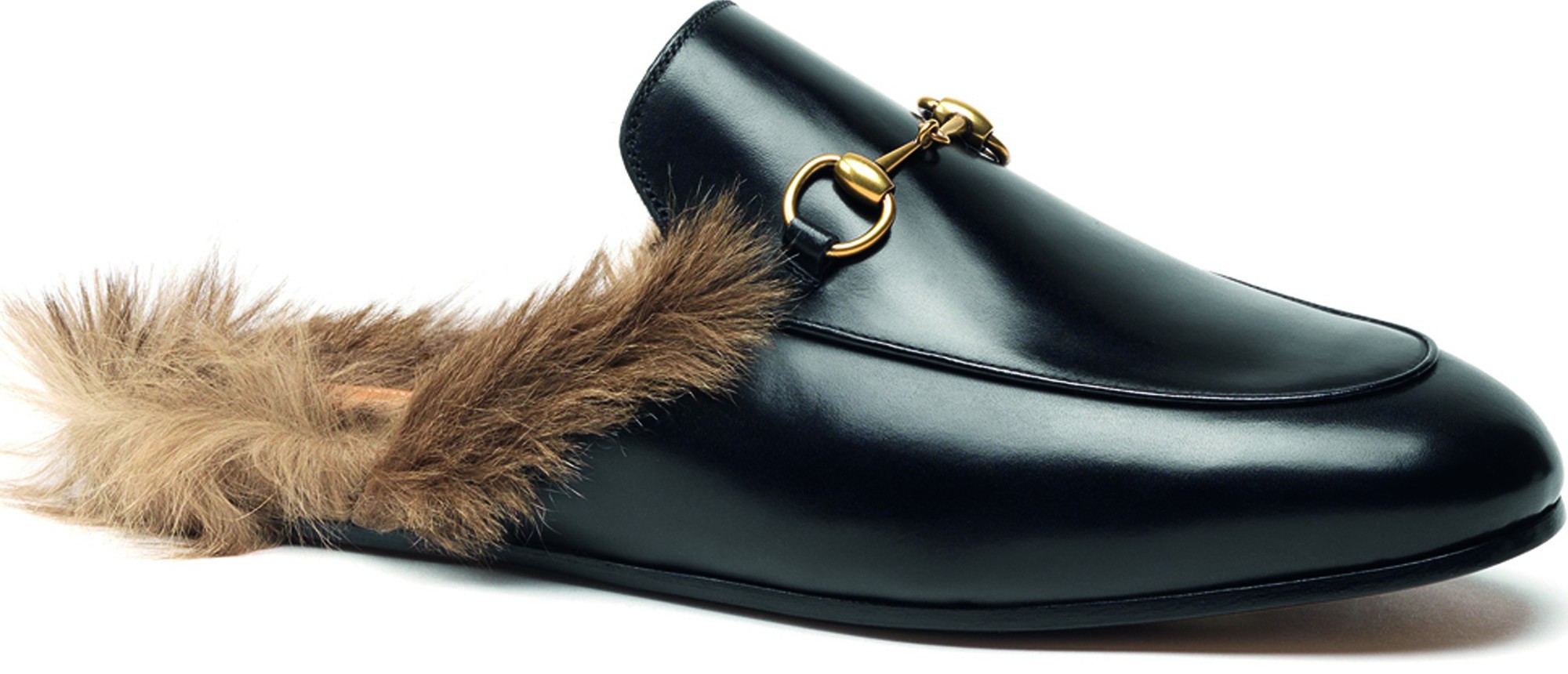
Welcome to the eighth installment of author Ted Scofield’s series on everybody else’s biggest problem but your own. If you missed one or more of the previous installments, you can find them here. New installments will be posted every two weeks, on Tuesdays.
 Here in Manhattan there’s a long waiting list for Gucci’s $995 kangaroo-fur-lined unisex leather slipper with horse bit detail, the must-have fall footwear, “fashion’s brass ring of the season.”
Here in Manhattan there’s a long waiting list for Gucci’s $995 kangaroo-fur-lined unisex leather slipper with horse bit detail, the must-have fall footwear, “fashion’s brass ring of the season.”
“But I need a pair in size 11 before the weekend,” I overheard a desperate gentleman tell a sympathetic Bloomingdale’s sales associate last week. “Can you call another store? I really need these!”
***
“Wanting more than you need’ is a simple definition of greed,” says theologian Donald DeMarco, and dictionaries support his seductively satisfying tease.
- greed : a selfish and excessive desire for more of something (as money) than is needed (Merriam-Webster)
- greed : a strong desire for more wealth, possessions, power, etc. than a person needs (Oxford)
- greed : a desire to have more of something than you need (YourDictionary.com)
Hallelujah! Consensus! So our quest for a collectively applicable definition of greed is finally over, right? We can stop examining various attributes of greed, as we’ve been doing for many weeks now, and rest easy with a simple to understand and apply definition: If we have or want more stuff than we need – boom! – we are greedy. Wrap it up with a bow and put it on the shelf. We’re done.
But of course I joke. Of all the attributes of greed we’ve analyzed so far – abundance, satisfaction, utility, etc. – need is perhaps the weakest and least instructive of them all.
Certainly all humans share basic needs – shelter from the elements, food and water, clothing. “To be physically alive is to have and seek satisfaction of needs,” writes David P. Levine in Psychoanalytic Studies.
But it only takes a second of thought to grasp the reality: As a culture, as a society, as a species, we could never possibly agree on what a person needs, and therefore we could never agree on when pursuing and fulfilling perceived or actual needs become greed.
At one tragic extreme, at least 700 million people do not have access to clean water. Every year, half a million children die from water-borne diseases. If we ask a rail-thin Brazilian teenager drinking foul water from a favela puddle about “needs,” what reply might we receive? “I really need the new iPhone”?
And at the other extreme…
Steven Spielberg needed a bigger boat. The “Jaws” director is selling his $184 million yacht, The Seven Seas, and replacing it with a larger model he’s reportedly having built for $250 million because he outgrew the meager 282-foot old one. The new vessel will be 18 feet longer.
Earlier in the year our national media reported on a “high-profile divorce.” The court asked the spouse seeking child support to itemize her monthly needs, which topped $1 million and included $6,800 for groceries, $2,000 for stationery, $160,000 for vacation accommodations, and $300,000 for a private jet. Monthly.
I’m sure we all agree that desiring potable water is a need and not a greed. I hope we all agree that $2,000-a-month for stationery flips the equation.
But these examples are indeed illustrative extremes. I personally cannot identify with the slum dweller forced to drink sewage, nor can I relate to the jet-setting parent who must dine on lobster and caviar every meal at 36,000 feet flying alone to a Ritz-Carlton while penning hundreds of stylish thank you notes.
By definition, the vast majority of us rest comfortably anxious in the middle of the bell curve. What do we “need”? When do our desire for and accumulation of more become greed? Do we need larger homes, nicer cars, a weekly manicure, a new set of clubs and season tickets?
No! Or … Yes! I don’t know, and I’m not about to lecture you on your needs, and I hope you’ll pay me the same courtesy, thanks. Honestly, I’d prefer not to think about it at all. Wouldn’t you?
Anglican Archbishop and author Donald W. B. Robinson said: “One of the weaknesses of our age is our apparent inability to distinguish our needs from our greeds.”
He’s correct, of course, but does our Western culture, or more specifically our American ethos, equip us or teach us or even want for us to have the ability to distinguish our true needs from selfish greeds? Are we encouraged at any level to think about, and act for, the sake of others, to deny our specious desires in favor of using our good fortune to satisfy the needs of our neighbors? Or are we programmed to believe that identifying and cultivating our authentic self is our path to happiness and prosperity, our raison d’être?
Theologian and author Tim Keller comments:
We live in an individualistic, consumeristic society, a society in which we are taught not self-renunciation but self-assertion – that your freedom, interests and needs must always come first.
My freedom, my interests, my needs must come first, and I know what awaits me when I successfully assert my triumphant self, thanks to the gospel according to Oprah: “I had no idea that being your authentic self could make me as rich as I’ve become. If I had, I’d have done it a lot earlier.”
Ms. Winfrey is far from alone in her discipleship to the authentic self, a pervasive phenomenon in the western world with adherents who genuinely believe it benefits humankind. As Shakespeare wrote in Hamlet, “This above all – to thine own self be true.” Carl Jung taught “the privilege of a lifetime is to become who you truly are.” And in her 2015 book Unleash Your Authentic Self!, Elaine McGuinness writes:
You can set yourself free from your struggles and pain in life by expressing your authentic self … Expressing your authentic self gives you the freedom to co-create your life with the universe according to what you desire … you forge a path for yourself with limitless opportunities, abundance, and prosperity … In expressing your authentic self, you free yourself to experience the abundance and prosperity in life that were always your birthright. Your freedom to manifest abundance in your life comes through being aligned with your authentic self.
Wow. So abundance and prosperity are our birthright and we must forge a path to co-create our lives with the universe according to what we desire. I am pretty sure I need to forge my path wearing $995 kangaroo-fur-lined Gucci slippers. What’s the number for that waiting list?

COMMENTS
3 responses to “Everybody Else’s Biggest Problem Pt. 8: My Needs, Your Greeds”
Leave a Reply















The more I think about it, and the more of these posts I read, the more convinced I become that greed is undefinable. We can define and show example of all of the other “deadly sins” (or human vices) but greed is impossible. Or maybe not? I’ll keep reading the series and see where it leads. Kudos on another thought provoking post. I think this series will be life-changing for many, many readers.
It’s all somewhat relative. Even a $5 pair of slippers could be classified as “greed” not “need” since most folks buying them live in warm, carpeted dwellings anyway, and even that $5 could feed a starving child for a week in a third-world country, thus saving their life.
It’s pretty difficult to convict people of their own greed.
50% of the U.S. is supported by the govt. even though they have smart phones, computers, and T.V. and they still think they are entitled to more. Until we agree that entitlement is greed this won’t be a constructive dialogue.